八年级下英语unit1知识点资料
人教版初二(下)英语unit1 what's the matter知识点讲解与练习

八年级下册英语Unit 1 what’s the matter?词汇篇学生通过本讲学习,能够掌握本单元的重点词汇句型,并在综合能力上有一定的拓展。
1.matter的用法(1)名词:事情,问题What’s the matter? =what’s wrong (with you)? =what’s the trouble怎么啦?出什么事啦?(2)动词:有重大影响,有重要性如:What does it matter?2.疾病的表达法have a cold/a fever/ a toothache/ a stomachache3.take 的固定搭配take one’s temperature/ take breaks/ take risks/take some medicine/take off/ take care of/take away 4.surprise的用法1.做名词:to one’s surprise 使。
惊讶的,出乎。
意料2.做动词:surprise sb使某人吃惊3.做形容词:surprising, surprised的用法5.get的用法get off下车/get on上车/get into陷入,参与6.be used to sth/doing sth 习惯于做某事be used to do sth 被用作去做某事used to do sth 习惯于做某事7.out of的固定搭配look out of 向。
外看/ get out of从。
出来/ run out of用光基础演练1.---What’s wrong ______you?---I fell off the bike and hurt my leg.A. ofB. withC. forD. by2.Tom and Jenny enjoyed _________playing computer games.A. himselfB. herselfC. ourselvesD. themselves3. Sally became interested ___________science and wanted to be a scientist.A. forB. inC. throughD. at4. ---I had a __________.---You’d better go to see a dentist.A. headacheB. feverC. coldD. toothache5. I didn’t _________my temperature, but I knew I had a fever.A. giveB. setC. takeD. show二、根据汉语意思翻译句子。
人教版英语八年级下册Unit1知识点

人教版英语八年级下册U n i t1知识点(总12页)--本页仅作为文档封面,使用时请直接删除即可----内页可以根据需求调整合适字体及大小--Unit 1An. 建议,忠告,劝告(1)advice是不可数名词,表示“一条建议”“两条建议”“一些建议”可用:a piece of advice;two piece of advice;some advice(2)advice作名词时的常用搭配:①ask sb. for advice征询某人的建议②give sb. some advice= give some advice to sb.给某人提出一些建议③give advice on sth.在某方面给出建议④take (follow) one’s advice接受某人的建议. He often gives us some advice.=He often gives some advice to us.他经常给我们一些建议。
★例题:Your ______ is very helpful. I guess I’ll take it.A. secretB. adviceC. promiseD. purpose答案:B 秘密;建议;承诺;目标。
由下句“我想我会采纳。
”可知“你的建议很有用”。
’s the matter怎么了(1)该句用来询问对方所遇到的麻烦,或医生及护士询问病人身体情况,常与with连用,后跟sb./sth.,意为“某人或某物怎么了?”.——What’s the matter (with you) (你)怎么了——I lost my pen./I have a cold. 我把我的钢笔弄丢了。
/我感冒了。
(2)“(你)怎么了?”各种常见表达:What’s the matter (with you)=What’s the trouble (with you)=What’s the problem(with you)=What’s wrong (with you)=What’s up?=What happened?★例题:——Nick is not at school. _______——He has a cold.A. Who’s thatB. What’s the matterC. How old is heD. How much is it答案:B 句意:——Nick没来上学。
最全面人教版八年级下册英语第一单元知识点归纳总结

Unit 1 What's the matter?一、词汇与短语◆重点单词A部分1.matter n. 问题;事情2.sore adj. 疼痛的;酸痛的3.stomachache n. 胃痛;腹痛4.foot n. 脚;足5.neck n. 颈;脖子6.stomach n. 胃;腹部7.throat n. 咽喉;喉咙8.hurt v. (使)疼痛;受伤9.fever n. 发烧10.passenger n. 乘客;旅客11.lie v. 躺;平躺12.break n. 间歇;休息13.rest v. &n. 放松;休息14.onto prep. 向;朝15.X-ray n. X射线;X光16.trouble n. 问题;苦恼17.toothache n. 牙痛18.hit n. (用手或器具)击;打19.headache n. 头痛20.herself pron. (she的反身代词)她自己21.off adv. & prep. 离开(某处);不工作;从……去掉B部分1.bandage n. 绷带v. 用绷带包扎2.press v. 压;挤;按3.sick adj. 生病的;有病的4.knee n. 膝;膝盖5.breathe v. 呼吸6.knife n. 刀7.sunburned adj. 晒伤的8.blood n. 血9.ourselves pron. (we反身代词)我们自己10.mean v. 意思是;打算11.climber n. 登山者;攀登者12.importance n. 重要性;重要13.risk n.&v. 危险;风险;冒险14.decision n. 决定;抉择15.accident n.(交通)事故;意外遭遇16.control v.&n. 限制;约束;管理17.situation n. 情况;状况18.spirit n. 勇气;意志19.kilo( = kilogram) n. 千克;公斤20.death n. 死;死亡21.rock n. 岩石22.nurse n. 护士◆重点短语A部分1.have a cold 感冒2.lie down 躺下3.have a stomachache 胃痛4.take one's temperature 量体温5.have a fever 发烧6.to one's surprise 使……惊讶的是7.get off 下车8.right away 立即;马上9.take breaks (take a break) 休息10.talk too much 说得太多11.drink enough water 喝足够的水12.have a very sore throat 嗓子非常疼13.get an X-ray 拍X光片14.see a dentist 看牙医15.drink some hot tea with honey 喝一些加蜂蜜的热茶16.put some medicine on sth.在……上面敷一些药17.feel very hot 感到很热18.sound like 听起来像19.all weekend 整个周末20.in the same way 以同样的方式21.go to a doctor 看医生22.go along 沿着……走23.on the side of the road 在马路边24.shout for help 大声呼救25.without thinking twice 没有多想26.have a heart problem 有心脏病27.thanks to 多亏了;由于28.in time 及时29.save a life 挽救生命30.get into trouble 陷入麻烦31.hurt oneself 受伤32.fall down落下;摔倒B部分1.be used to 习惯于……;适应于……2.in a difficult situation 在困境中3.take risks (take a risk) 冒险4.keep on doing sth. 继续(或坚持)做某事5.run out (of) 用尽;耗尽6.make a decision 作出决定7.cut off 切除8.get hit on the head 撞到头部9.get out of 离开;从……岀来10.be interested in 对……感兴趣11.give up 放弃12.mean doing sth. 意味着做某事13.put a bandage on sth. 用绷带包扎…14.lose one's life 失去生命15.feel sick 感到恶心16.mountain climbing 登山运动17.have problems breathing 呼吸困难18.be in control of 掌管;管理◆重点句子A部分1.What's the matter with you?=What's the trouble with you?=What's wrong with you?你怎么了?2.What should she do? 她该怎么办呢?3.Did you fall down? 你跌倒了吗?4.Should I take my temperature? 我应该量一下体温吗?5.I think I sat in the same way for too long without moving.我想我以同样的姿势一动不动地坐得太久了。
人教版八年级英语下册Unit1知识点归纳
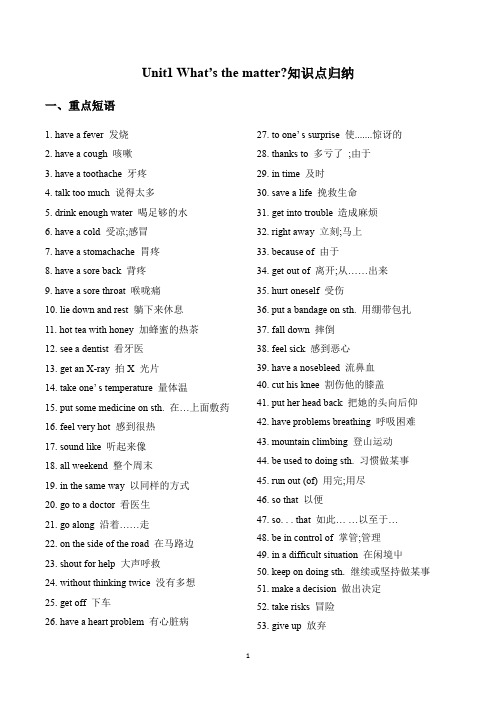
Unit1 What’s the matter?知识点归纳一、重点短语1. have a fever 发烧2. have a cough 咳嗽3. have a toothache 牙疼4. talk too much 说得太多5. drink enough water 喝足够的水6. have a cold 受凉;感冒7. have a stomachache 胃疼8. have a sore back 背疼9. have a sore throat 喉咙痛10. lie down and rest 躺下来休息11. hot tea with honey 加蜂蜜的热茶12. see a dentist 看牙医13. get an X-ray 拍X 光片14. take one’ s temperature 量体温15. put some medicine on sth. 在…上面敷药16. feel very hot 感到很热17. sound like 听起来像18. all weekend 整个周末19. in the same way 以同样的方式20. go to a doctor 看医生21. go along 沿着……走22. on the side of the road 在马路边23. shout for help 大声呼救24. without thinking twice 没有多想25. get off 下车26. have a heart problem 有心脏病27. to one’ s surprise 使.......惊讶的28. thanks to 多亏了;由于29. in time 及时30. save a life 挽救生命31. get into trouble 造成麻烦32. right away 立刻;马上33. because of 由于34. get out of 离开;从……出来35. hurt oneself 受伤36. put a bandage on sth. 用绷带包扎37. fall down 摔倒38. feel sick 感到恶心39. have a nosebleed 流鼻血40. cut his knee 割伤他的膝盖41. put her head back 把她的头向后仰42. have problems breathing 呼吸困难43. mountain climbing 登山运动44. be used to doing sth. 习惯做某事45. run out (of) 用完;用尽46. so that 以便47. so. . . that 如此… …以至于…48. be in control of 掌管;管理49. in a difficult situation 在闲境屮50. keep on doing sth. 继续或坚持做某事51. make a decision 做出决定52. take risks 冒险53. give up 放弃二、用法归纳1.need to do sth.需要去做某事2.see sb. doing sth.看见某人正在做某事3.ask sb. sth.询问某人某事4.expect sb. to do sth.期望某人做某事5.agree to do sth.同意做某事6.help sb. ( to ) do sth.帮助某人做某事7.want to do sth.想要做某事8.tell sb. To do sth.告诉某人做某事9.have problems (in) doing sth.做某事有困难e sth. To do sth. 用某物去做某事11.be/get used to doing sth.习惯于做某事12.seem to do sth.好像做某事13.keep on doing sth.继续做某事14.mind doing sth.介意做某事三、重点句型1. What’ s the matter? 你怎么了?What’ s the matter with you? = What’s the trouble with you? = What’ s wrong with you?2. What should she do? 她该怎么办呢?Should I take my temperature? 我应该量一下体温吗?主语+ should/shouldn’t + 动词原形. ..①You should lie down and rest.你应该躺下休息一会儿。
八年级下英语第一单元知识点总结
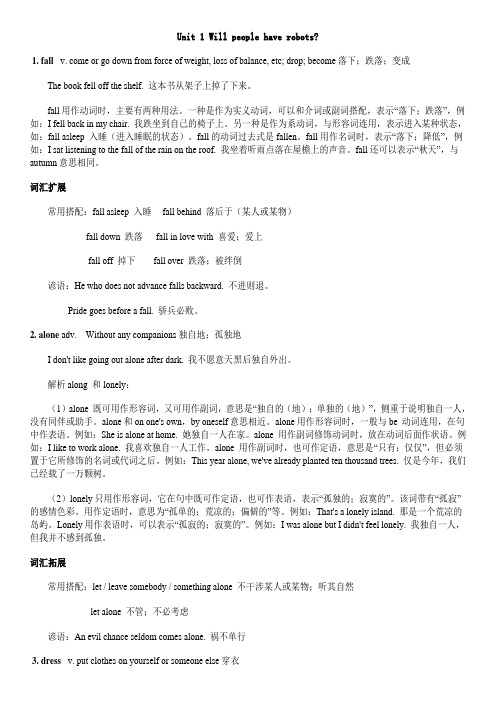
Unit 1 Will people have robots?1. fall v. come or go down from force of weight, loss of balance, etc; drop; become 落下;跌落;变成The book fell off the shelf. 这本书从架子上掉了下来。
fall用作动词时,主要有两种用法。
一种是作为实义动词,可以和介词或副词搭配,表示“落下;跌落”,例如:I fell back in my chair. 我跌坐到自己的椅子上。
另一种是作为系动词,与形容词连用,表示进入某种状态,如:fall asleep 入睡(进入睡眠的状态)。
fall的动词过去式是fallen。
fall用作名词时,表示“落下;降低”,例如:I sat listening to the fall of the rain on the roof. 我坐着听雨点落在屋檐上的声音。
fall还可以表示“秋天”,与autumn意思相同。
词汇扩展常用搭配:fall asleep 入睡fall behind 落后于(某人或某物)fall down 跌落fall in love with 喜爱;爱上fall off 掉下fall over 跌落;被绊倒谚语:He who does not advance falls backward. 不进则退。
Pride goes before a fall. 骄兵必败。
2. alone adv. Without any companions 独自地;孤独地I don't like going out alone after dark. 我不愿意天黑后独自外出。
解析along 和lonely:(1)alone 既可用作形容词,又可用作副词,意思是“独自的(地);单独的(地)”,侧重于说明独自一人,没有同伴或助手。
alone和on one's own,by oneself意思相近。
八年级英语下册第一单元知识点汇总

Unit 1 What’s the matter?词句精讲精练词汇精讲1. have a coldhave a cold是动词短语,意为“患感冒,伤风”,也可以说成catch a cold/get a cold或take a cold。
其中have表示“患病,得病”,不能用于进行时态,但可与一段时间连用,表示状态;而catch/geta cold则表示瞬时动作,不能同一段时间连用。
例如:I have had a cold for three days. 我感冒三天了。
此句也可以表达为:I had/caught/got a cold three days ago.【拓展】表示人体某部位“痛”时的几种结构:(1)have a + 身体部位名词后加-ache构成。
例如:have a headache 头痛have a toothache 牙痛have a stomachache胃痛(2)have a sore + 身体部位名词。
例如:have a sore throat 喉咙痛have a sore arm 胳膊痛have a sore foot 脚痛(3)身体部位+ hurt/ache。
例如:My eyes hurt. 我眼睛痛。
My legs ache. 我腿疼。
(4)have a pain in/ on + the + 身体部位。
例如:I have a pain in the arm. 我胳膊痛。
(5)There is something wrong with + one’s + 身体部位。
例如:There is something wrong with your eyes. 你的眼睛有毛病。
2. rest(1)rest作及物动词,意为“使休息”,作不及物动词,意为“休息”。
例如:You should rest your eyes after a lot of reading.在大量阅读之后,你应该休息一下你的眼睛。
人教版英语八年级下册unit1单元知识点归纳总结
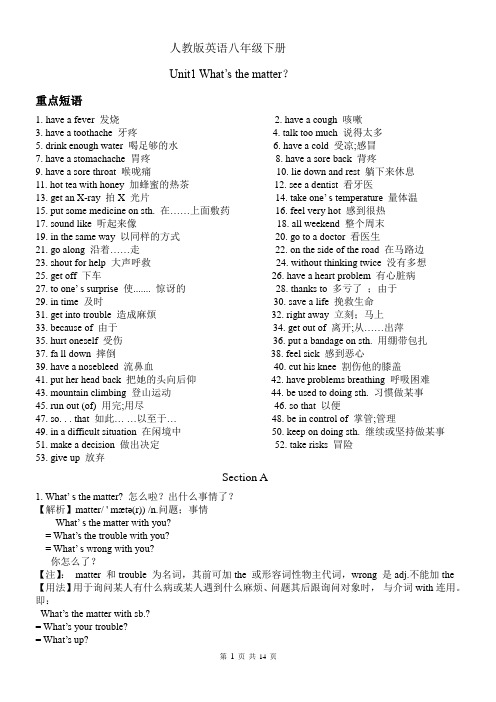
人教版英语八年级下册Unit1 What’s the matter?重点短语1.have a fever 发烧2. have a cough 咳嗽3. have a toothache 牙疼4. talk too much 说得太多5. drink enough water 喝足够的水6. have a cold 受凉;感冒7. have a stomachache 胃疼8. have a sore back 背疼9. have a sore throat 喉咙痛10. lie down and rest 躺下来休息11. hot tea with honey 加蜂蜜的热茶12. see a dentist 看牙医13. get an X-ray 拍X 光片14. take one’ s temperature 量体温15. put some medicine on sth. 在……上面敷药16. feel very hot 感到很热17. sound like 听起来像18. all weekend 整个周末19. in the same way 以同样的方式20. go to a doctor 看医生21. go along 沿着……走22. on the side of the road 在马路边23. shout for help 大声呼救24. without thinking twice 没有多想25. get off 下车26. have a heart problem 有心脏病27. to one’ s surprise 使....... 惊讶的28. thanks to 多亏了;由于29. in time 及时30. save a life 挽救生命31. get into trouble 造成麻烦32. right away 立刻;马上33. because of 由于34. get out of 离开;从……出萍35. hurt oneself 受伤36. put a bandage on sth. 用绷带包扎37. fa ll down 摔倒38. feel sick 感到恶心39. have a nosebleed 流鼻血40. cut his knee 割伤他的膝盖41. put her head back 把她的头向后仰42. have problems breathing 呼吸困难43. mountain climbing 登山运动44. be used to doing sth. 习惯做某事45. run out (of) 用完;用尽46. so that 以便47. so. . . that 如此… …以至于…48. be in control of 掌管;管理49. in a difficult situation 在闲境中50. keep on doing sth. 继续或坚持做某事51. make a decision 做出决定52. take risks 冒险53. give up 放弃Section A1. What’ s the matter? 怎么啦?出什么事情了?【解析】matter/ ' mætə(r)) /n.问题;事情What’ s the matter with you?= What’s the trouble with you?= What’ s wrong with you?你怎么了?【注】:matter 和trouble 为名词,其前可加the 或形容词性物主代词,wrong 是adj.不能加the 【用法】用于询问某人有什么病或某人遇到什么麻烦、问题其后跟询问对象时,与介词with连用。
新人教八年级英语下册单元复习及周末同步辅导资料(八下Unit 1)

新人教八年级英语下册单元复习及周末同步辅导资料Unit 1 What’s the matter?一、基础知识1. What’ s the matter? 怎么啦?出什么事情了?【解析】matter/ ' mætə(r)) /n.问题;事情What’ s the matter with you?= What’s the trouble with you? = What’ s wrong with you? 你怎么了?【注】:matter 和trouble 为名词,其前可加the 或形容词性物主代词,wrong 是adj. 不能加the 【用法】用于询问某人有什么病或某人遇到什么麻烦、问题其后跟询问对象时,与介词with连用。
即:What’s the matter with sb.? = What’s your trouble? = What’s up? = What happens to sb.?—What’s the matter with you ?— I have a bad cold.2. I had a cold.我感冒了。
have a cold = catch a cold = have the flu感冒have a fever 发烧have a cough咳嗽have a stomachache胃疼,肚子疼have a toothache牙疼have a headache头疼3. 身体部位+ache(疼痛)构成新的复合词stomach+ache=stomachache head+ache=headachetooth+ache=toothache back+ache=backache后背痛4. much too+形容词,意为“太...... ”;too much +名词,意为“很多,大量”。
5. enough 足够的/地,enough通常放在名词前,形容词、副词之后。
英语八年级下册m1知识点

英语八年级下册m1知识点英语八年级下册M1是说英语八年级下册的第一模块,这个模块主要是讲述了一些重要的知识点,在这里我们来一一了解一下。
一、动词时态动词时态是英语语言中非常重要的一部分,我们必须掌握好它。
动词时态包括:现在时、过去时和将来时。
现在时表示现在正在发生的事情,过去时表示已经发生了的事情,将来时表示将要发生的事情。
二、被动语态被动语态是一个非常常用的语法形式,它用于表示动作的承受者。
例如:这本书被我借走了。
在这个句子中,“这本书”是承受者,“我”是动作的执行者。
三、宾语从句宾语从句是一个包含在宾语中的子句,它常常作为主句的宾语。
例如:我知道他在做什么。
在这个句子中,“他在做什么”是宾语从句。
四、状语从句状语从句是一个包含在句子中的子句,它通常用来修饰句子中的动词,形容词或者副词。
例如:当我见到他时,他正在做功课。
在这个句子中,“当我见到他时”是状语从句。
五、比较级和最高级比较级和最高级是英语中用来比较两个或多个事物差异的基本形式。
比较级表示两个事物之间的大小或者差异,最高级用来表示三个或多个事物之间的大小或者差异。
六、情态动词情态动词是一组特殊的助动词,它们与其它动词搭配使用,用来表达肯定、否定、建议、请求、可能性、能力等。
例如:我可以帮助你。
在这个句子中,“可以”就是一个情态动词。
以上就是英语八年级下册M1的知识点总结。
我们如果掌握了这些语法规则,就能更好地学习英语,更好地理解和应用英语。
人教版新版八年级英语下册Unit1 知识要点
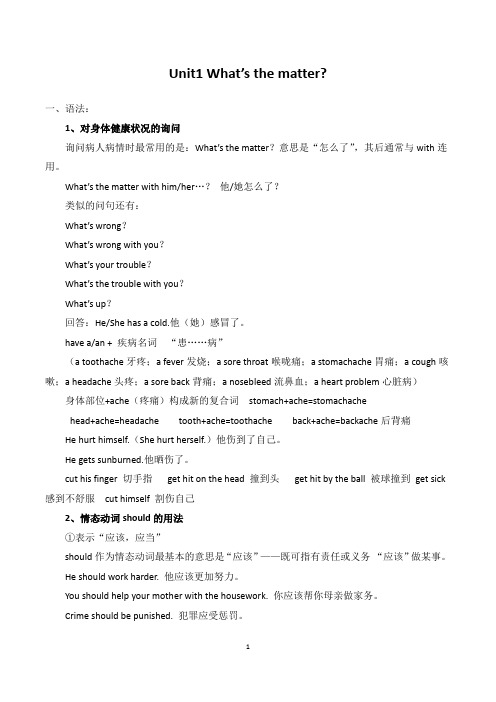
Unit1 What’s the matter?一、语法:1、对身体健康状况的询问询问病人病情时最常用的是:What’s the matter?意思是“怎么了”,其后通常与with连用。
What’s the matter with him/her…?他/她怎么了?类似的问句还有:What’s wrong?What’s wrong with you?What’s your trouble?What’s the trouble with you?What’s up?回答:He/She has a cold.他(她)感冒了。
have a/an + 疾病名词“患……病”(a toothache牙疼;a fever发烧;a sore throat喉咙痛;a stomachache胃痛;a cough咳嗽;a headache头疼;a sore back背痛;a nosebleed流鼻血;a heart problem心脏病)身体部位+ache(疼痛)构成新的复合词stomach+ache=stomachachehead+ache=headache tooth+ache=toothache back+ache=backache后背痛He hurt himself.(She hurt herself.)他伤到了自己。
He gets sunburned.他晒伤了。
cut his finger 切手指get hit on the head 撞到头get hit by the ball 被球撞到get sick 感到不舒服cut himself 割伤自己2、情态动词should的用法①表示“应该,应当”should作为情态动词最基本的意思是“应该”——既可指有责任或义务“应该”做某事。
He should work harder. 他应该更加努力。
You should help your mother with the housework. 你应该帮你母亲做家务。
Unit1what’sthematter_SectionA知识点梳理人教版八年级英语下册

人教版八年级下册英语课本知识点梳理Unit 1 wh at’s the matter? sectionA课文内容:What's the matter? 怎么了? (教材第1页)【用法详解】What's the matter? 怎么了?/出什么事了?常用于询问某人患了何种疾病,遇到了什么困难等,也可用于询问某物出了什么故障,其后可接with sb./sth.,表示“某人/某物怎么了?”。
其中matter 用作名词,意为“问题;事情”matter前须加定冠词the。
【例句】What's the matter? 怎么了?Bad luck.I lost my pen. 真倒霉,我弄丢了钢笔.What's the matter with him? 他怎么了?He has a sore back.他背痛【拓展】matter[动词] 要紧;有关系多用在否定句、疑问句或条件句中It doesn't matter.没关系。
(通常用来回答对方的道歉)I have a cold. 我感冒了。
(教材第1页)【用法详解】have a cold (患)感冒。
其中have 用作及物动词,意为“患(病);遭受(病痛)”,常用于结构“have a/an +疾病名称”表示患病或身体某部位不舒服。
此时它不能用于进行时态,其第三人称单数形式为has,过去式为had。
常见的表示病痛的短语还有:have a fever 发烧have a toothache 牙疼have a headache头痛have a cough 咳嗽have a stomachache胃痛Do you often have a cold? 你经常感冒吗?Jim had a stomachache after supper yesterday.吉姆昨天晚饭后胃痛。
l have a stomachache.我胃痛。
( 教材第1 页)【用法详解】stomachache [名词]胃痛;腹痛是由“名词stomach(;腹部)+ache(疼痛)”构成的复合名词。
(完整版)Unit1人教版八年级英语下册语法与知识点,推荐文档

Unit 1第一部分:Grammar一、情态动词(Modal Verbs)情态动词should 意为“应该,应当”,必须和后面的动词原形一起构成谓语,没有人称和数的变化。
用以表达职责和义务、提出劝告,而且表述的是自己的主观看法。
注意:should 在以why,who,how 等疑问词开头的问句中,意为“竟然,居然,怎么会”,表示意外、惊喜或在说话人看来是不可思议的。
三、反身代词表示反射或强调的代词叫做反身代词。
反身代词是由第一人称、第二人称形容词性物主代词或第三人称代词的宾格形式,词尾加self 或selves 组成。
反身代词可译“本人”、“本身”,为加强语气,也常翻译为“亲自”、“自己”。
不定人称代词one ---- o neself.第二部分:单词用法Section A1.What’s the matter?怎么了?该句常用询问某人患了何种疾病或遇到了什么麻烦,其后用with 引出对象。
1). What’s the matter with sb.?=what’s wrong with sb.?=what’s the trouble/problem with sb.?=what’s one’s trouble/problem?e.g. What’s the matter w ith Tom?=what’s with Tom?=What’s the with Tom?=What’s Tom’s?2). matter, 名词,“问题,事情”e.g. We have important (matter) to discuss.我们有些重要的问题要讨论。
3). 动词,“要紧,关系重大”e.g. It dosen’t that you came late.2.I have a cold. 我感冒了。
1).have/get/catch a cold “感冒,着凉”The old man a cold yesterday.那位老人昨天感冒了。
人教版英语八年级下册Unit1 知识点精讲
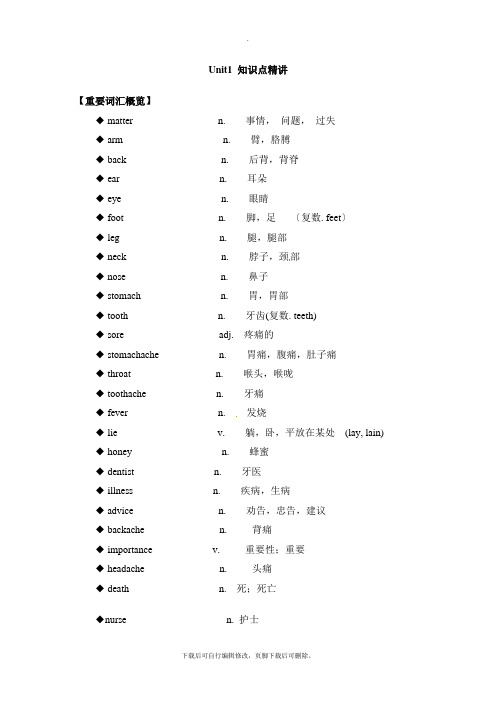
Unit1 知识点精讲【重要词汇概览】◆ matter n.事情,问题,过失◆ arm n.臂,胳膊◆ back n.后背,背脊◆ ear n.耳朵◆ eye n.眼睛◆ foot n.脚,足〔复数. feet〕◆ leg n.腿,腿部◆ neck n.脖子,颈部◆ nose n.鼻子◆ stomach n.胃,胃部◆ tooth n.牙齿(复数. teeth)◆ sore adj.疼痛的◆ stomachache n.胃痛,腹痛,肚子痛◆ throat n.喉头,喉咙◆ toothache n.牙痛◆ fever n.发烧◆ lie v.躺,卧,平放在某处(lay, lain)◆ honey n.蜂蜜◆ dentist n.牙医◆ illness n.疾病,生病◆ advice n.劝告,忠告,建议◆ backache n.背痛◆ importance v. 重要性;重要◆ headache n. 头痛◆ death n. 死;死亡◆nurse n. 护士◆ knife n. (复数.knives)刀【重要词组概览】◆ have a cold患感冒◆ take breaks(take a break) 休息◆ lie down 躺下◆ get off 下车◆ be used to 习惯于...;适应于...◆ on the other hand另一方面◆ get a cold患感冒◆ see a dentist看牙医◆take one’s temperature 量体温◆ make sb sick使某人不舒服(患锁病)◆ have a sore throat嗓子痛◆ have a fever发烧,发热◆ have a toothache牙痛◆ have a backache背痛◆ have a headache头痛◆give up 放弃◆cut off 切除◆get out 〔of〕用尽;耗尽◆take risks〔take a risk〕冒险◆get into 陷入;参与◆right away 立即;马上◆to one’s s urprise 使...惊讶的;出乎...意料【语法知识聚焦】看病需要和医生交流,这是英语口语中必不可少的内容。
人教版八年级英语下册 Unit1 知识点讲解
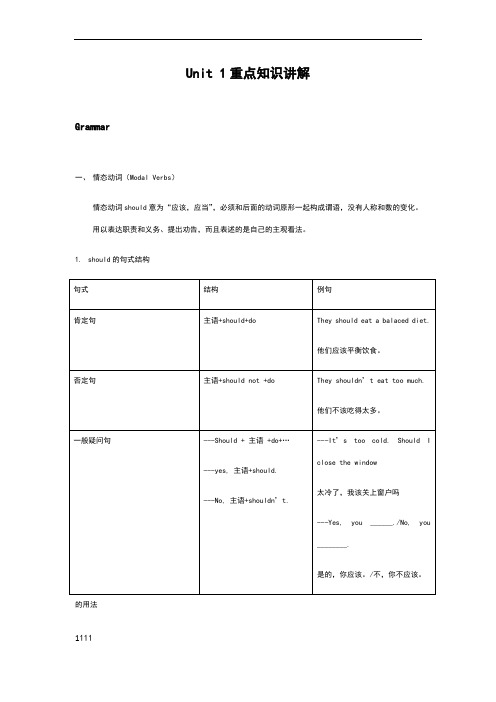
Unit 1重点知识讲解Grammar一、情态动词(Modal Verbs)情态动词should意为“应该,应当”,必须和后面的动词原形一起构成谓语,没有人称和数的变化。
用以表达职责和义务、提出劝告,而且表述的是自己的主观看法。
1.should的句式结构的用法注意:should在以why,who,how等疑问词开头的问句中,意为“竟然,居然,怎么会”,表示意外、惊喜或在说话人看来是不可思议的。
二、其他表示建议的句型三、反身代词表示反射或强调的代词叫做反身代词。
反身代词是由第一人称、第二人称形容词性物主代词或第三人称代词的宾格形式,词尾加self或selves组成。
反身代词可译“本人”、“本身”,为加强语气,也常翻译为“亲自”、“自己”。
不定人称代词one-----oneself.1、反身代词的分类2、反身代词的用法单词的用法Section A1.What’s the matter怎么了该句常用询问某人患了何种疾病或遇到了什么麻烦,其后用with引出对象。
1). What’s the matter with sb.=what’s wrong with sb.=what’s the trouble/problem with sb.=what’s one’s trouble/problem. What’s the matter with Tom=what’s _________ with Tom=What’s the _________ with Tom=What’s Tom’s _________2). matter, 名词,“问题,事情”. We have important _________(matter) to discuss.我们有些重要的问题要讨论。
3). 动词,“要紧,关系重大”. It dosen’t _________ that you came late.2.I have a cold.我感冒了。
八年级英语下册知识点

八年级英语下册知识点Unit 1 what’s the matter?一、重点短语词组1. have a fever 发烧2. have a cough 咳嗽3. have a toothache 牙疼4. talk too much 说得太多5. drink enough water 喝足够的水6. have a cold 受凉;感冒7. have a stomachache 胃疼8. have a sore back 背疼9. have a sore throat 喉咙痛10. lie down and rest 躺下来休息11. hot tea with honey 加蜂蜜的热茶12. see a dentist 看牙医13. get an X-ray 拍X 光片14. take one’s temperature 量体温15. balanced diet平衡饮食16. go along…沿着……走17. take breaks 休息18. sound like 听起来像19. all weekend 整个周末20. in the same way 以同样的方式21. on the side of the road 在马路边22. shout for help 大声呼救23. without thinking twice 没有多想24. get off 下车get on 上车25. have a heart problem 有心脏病26. to one’s surprise 使.......惊讶的27. thanks to 多亏了;由于28. in time 及时29. save a life 挽救生命30. get into trouble 造成麻烦31. agree to do sth. 同意做什么32. because of 由于33. get out of 离开;从……出去34. hurt oneself 受伤35. put a bandage on sth.用绷带包扎36. fall down 摔倒37. feel sick 感到恶心38. have a nosebleed 流鼻血39. cut his knee 割伤他的膝盖40. put her head down 把她的头低下41. have problems breathing 呼吸困难42. mountain climbing 登山运动43. be used to doing sth. 习惯做某事44. take risks 冒险45. so that 为了46. So… that 如此……以至于…47. be in control of 掌管;管理48. in a difficult situation 在困境中49. keep on doing sth. 继续或坚持做某事 50. make a decision 做出决定51. stay healthy 保持健康=keep healthy=keep in good health=keep fit52. put some medicine on sth. 在…上面敷药二、重点句型1. What’s the matter?你怎么了?= What’s the trouble / problem with you?= What’s wrong with you?2. What should she do? 她该怎么办呢?Should I take my temperature? 我应该量一下体温吗?主语+ should/shouldn’t + 动词原形...①You should lie down and rest. 你应该躺下休息一会儿。
人教版英语八年级下册第一单元Unit 1知识点
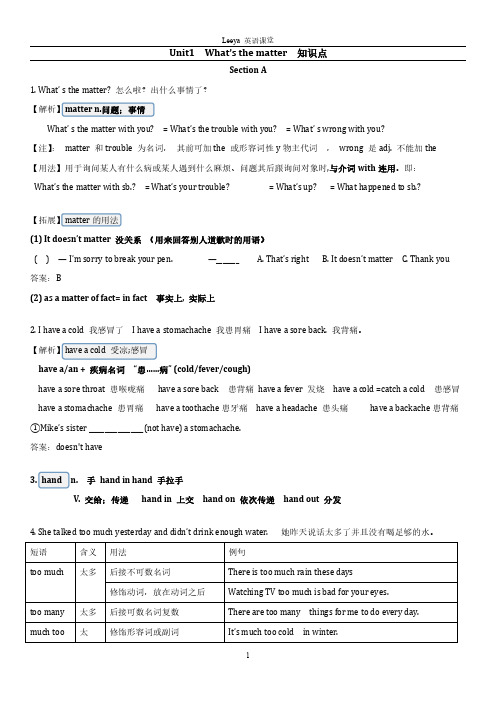
Unit1What’s the matter知识点Section A1.What’s the matter?怎么啦?出什么事情了?【解析】matter n.问题;事情What’s the matter with you?=What’s the trouble with you?=What’s wrong with you?【注】:matter和trouble为名词,其前可加the或形容词性y物主代词,wrong是adj.不能加the【用法】用于询问某人有什么病或某人遇到什么麻烦、问题其后跟询问对象时,与介词with连用。
即:What’s the matter with sb.?=What’s your trouble?=What’s up?=What happened to sb.?【拓展】matter的用法(1)It doesn’t matter没关系(用来回答别人道歉时的用语)()—I’m sorry to break your pen.—_______ A.That’s right B.It doesn’t matter C.Thank you 答案:B(2)as a matter of fact=in fact事实上,实际上2.I have a cold我感冒了I have a stomachache我患胃痛I have a sore back.我背痛。
【解析】have a cold受凉;感冒have a/an+疾病名词“患……病”(cold/fever/cough)have a sore throat患喉咙痛have a sore back患背痛have a fever发烧have a cold=catch a cold患感冒have a stomachache患胃痛have a toothache患牙痛have a headache患头痛have a backache患背痛①Mike’s sister_________________(not have)a stomachache.答案:doesn't have3.hand n.手hand in hand手拉手V.交给;传递hand in上交hand on依次传递hand out分发4.She talked too much yesterday and didn’t drink enough water.她昨天说话太多了并且没有喝足够的水。
人教版八年级英语下册1-5单元知识点归纳
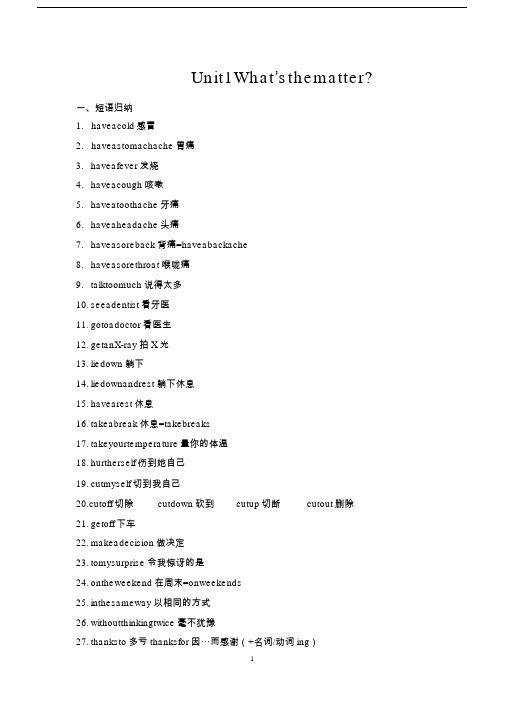
Unit1What’sthematter?一、短语归纳1.haveacold感冒2.haveastomachache胃痛3.haveafever发烧4.haveacough咳嗽5.haveatoothache牙痛6.haveaheadache头痛7.haveasoreback背痛=haveabackache8.haveasorethroat喉咙痛9.talktoomuch说得太多10.seeadentist看牙医11.gotoadoctor看医生12.getanX-ray拍X光13.liedown躺下14.liedownandrest躺下休息15.havearest休息16.takeabreak休息=takebreaks17.takeyourtemperature量你的体温18.hurtherself伤到她自己19.cutmyself切到我自己20.cutoff切除cutdown砍到cutup切断cutout删除21.getoff下车22.makeadecision做决定23.tomysurprise令我惊讶的是24.ontheweekend在周末=onweekends25.inthesameway以相同的方式26.withoutthinkingtwice毫不犹豫27.thanksto多亏thanksfor因⋯而感谢(+名词/动词ing)28.intime及时ontime按时29.savealife挽救生命30.getintotrouble陷入麻烦31.rightaway马上32.falldown跌倒33.waitfor等待34.beinterestedindoingsth.对做某事感兴趣35.giveup放弃二、用法集萃1.询问有什么病或有什么麻烦:What’sthematter(withsb.)?2.疾病的表达:have/hasa+疾病名称3.太多:toomuch+不可数名词;toomany+可数名词复数形式太:muchtoo+形容词4. enough足够的:①形容词+enough②enough+名词③itisenough+todosth.5. lie躺下过去式:lay现在分词:lying6.seesb.doingsth.看见某人正在做某事(正在进行)seesb.dosth.看见某人做了某事(看见动作的全过程)7.expecttodosth.期望做某事8.needtodosth.需要做某事9.helpsb.(to)dosth.帮助某人做某事10.tellsb.(not)todosth.告诉某人(不要)做某事11.asksb.todosth.要求某人做某事12.wanttodosth.想要做某事13.agreetodosth同.意做某事disagreetodosth.不同意做某事agreewithsb.同意某人的意见14.trouble问题;麻烦havetrouble/problemdoingsth.做某事有困难15.介词+doing常见的介词有:at;for;with;without;inabout16.be/getusedtodoingsth.习惯于做某事17.keepondoingsth.继续做某事18.minddoingtsh.介意做某事19.反身代词:myself我自己yourself你自己himself他自己herself她自己itself它自己复数:ourselves我们自己yourselves你们自己themselves他们自己20.knife-knives刀名词复数规则变化:①一般情况+s②以e结尾+s③以s、x、ch、sh结尾+es④以辅音字母+y结尾,变y为i+es⑤以o结尾,有生命+es;无生命+s⑥以f/fe结尾,变f/fe为v+es不规则变化:foot-feet脚、足tooth-teeth牙齿man-men男人woman-women女人mouse-mice老鼠21.important重要的importance重要性different不同的difference差异性22.death死亡(名词)die死(动词)dead死的(形容词)三、书面表达Howtokeephealthy如何保持健康Healthisimportant.Everyonewantstobehealthy.Letmetellyouhowtokeephealthy.Firstofall,weshouldeathealthyfood.Weshouldeatmorevegetablesandfruit.Wealson eedtodrinkmilk.Secondly,weshouldexercisealot.Weshoulddosomesportsafterschool.Finally,weshouldhaveenoughsleep.Tohaveagoodrest,weshouldgotobedearlyandgetupearly.Ithinkitisimportantforustokeephealthy.3Unit2I’llhelptocleanupthecityparks.一、短语归纳1. cleanup打扫干净cheerup使兴起来代词放中间2.giveout分发3.handout分发eupwith想出;提出(idea、plan等)5. putoff推迟puton穿衣服putup张贴putaway把⋯收好6.callup打电话;征召edtodosth.曾经做某事beusedtodingsth习.惯于做某事8. lonely孤独的(常用于feel之后)alone独自一人9.carefor照顾=takecareof10.afeelingofsatisfaction一种满足感11.tryout参加⋯选拔12.raisemoney募捐13.fixup修理14.giveaway赠送(money、oldclothes/books等)giveup放弃15.takeafter(外貌或行为)像16.besimilarto与⋯相似17.setup建立18.makeadifference影响;有作用19.disabledpeople残疾人20.makeaplan制定计划21.oldpeople’shome养老院22.helpoutwithsth.帮助解决困难23.abooklover书迷24.attheageof在⋯岁时etrue实现(与dream连用)26.atthesametime同时27.homelesspeople无家可归的人28.beworriedabout为⋯而担心worryabout担心29.forexample例如30.runoutof用完31.not⋯anymore不再32.atonce立刻;马上=rightaway二、用法集萃1.volunteertodosth自愿做某事2. difficult困难的difficulty困难havedifficulty(in)doingsth.做某事有困难3.excited兴奋的(人作主语)exciting使人兴奋的(物作主语)口诀:人+ed物+ing4.疑问词(how,what,where)+todo5. decidetodosth.决定做某事名词形式:decision makeadecision做决定6.learntodosth.学习做某事7.agoodwaytodosth.做某事的好方法8.wouldliketodosth.=wanttodosth.想要做某事9.thankyouforsth./doingsth.因某事/做某事而感谢10.kind善良的kindness善意Unit3Couldyoupleasecleanyourroom?一、短语归纳1.dothedishes清洗餐具2.takeouttherubbish倒垃圾3.foldtheclothes叠衣服foldmy/your/hisclothes4.sweepthefloor扫地5.makethebed铺床makemy/your/hisbed6.cleanthelivingroom打扫客厅7.helpoutwithsth.帮助解决某事8.atleast至少eover过来;顺便来访10.infrontof在⋯前面11.takethedogforawalk遛狗12.allthetime一直13.assoonas一⋯就⋯14.insurprise惊讶地15.hangout闲逛16.dochores做家务17.awasteoftime浪费时间18.inorderto为了19.getgoodgrades取得好成绩20.dependon依靠21.takecareof=carefor=lookafter照顾22.asaresult结果23.fallill生病二、用法集萃1.finishdoingsth.完成做某事2.if如果(主将从现,if后为从句,用一般现在时);是否(位于动词之后)3.assoonas一⋯就⋯.主将从现,assoonas后为从句4.replyangrily生气地回答(副词修饰动词,一般位于动词之后)abeautifuldog一只漂亮的狗(形容词修饰,名词,位于名词前)口诀:形名动副5.beangrywithsb.生某人的气6.as+形容词原级+as和⋯一样7.neitherdidI我也没有neither+be动词/助动词(do/does/did)/情态动词+主语“主语也不⋯..”so+be动词/助动词(do/does/did)/情态动词+主语“主语也⋯”8.can-could可以can,could还可以表示请求,could比can更有礼貌肯定回答:Sure./Ofcourse./Noproblem./Yes,sure.否定回答:No,youcan’t./Sorry,Ican’t.9.asksb.todosth.要求某人做某事10.borrow⋯from⋯跟⋯借(借进来)lend⋯to⋯把⋯借给⋯.(借出去)11.invitesb.todosth.邀请某人做某事12.helpwithsth.helpsb.(to)dotsh.帮助做某事13.havetimetodosth.有时间做某事havenotimetodosth没.时间做某事14.letsb.dosth.让某人做某事15.makesb.dosth.让某人做某事16.spend花费人+spend+时间+onsth/doingsth在某事上花时间/花时间做某事cost花费物+cost+金钱$某物花了多少钱take(took)花费Ittakes/tooksb.+时间+todo.做某事花了某人多少时间payfor付费17.itis+adj(forsb.)+todosth.做某事对某人而言是⋯的18.fair公平的unfair不公平的fairness公平性19.doone’spartindoingsth.尽自己的职责做某事20.the+比较级,the+比较级越...越⋯比较级and比较级越⋯越⋯theearlier⋯thebetter越早越好betterandbetter越来越好Unit4Whydon’tyoutalktoyourparents?一、短语归纳1.talkto/withsb.与某人交谈talkaboutsth.谈论某事2.freetime空闲时间3.allowab.todosth.允许某人做某事allowdoingsth.允许做某事4.hangout闲逛5.getintoafight争吵;打架6.sothat为了;以便于7.lookthrough浏览;快速查看8.workout成功地发展;解决9.getonwith/getalongwith和睦相处municatewithsb.与某人交谈11.abigdeal重要的事petewithsb.与某人竞争13.examskills应试技巧14.cutout删除pare⋯with⋯比较16.not..until直到⋯才17.arguewithsb.与某人争吵18.noproblem没问题19.not..anymore不再20.inmyopinion依我看21.thanksfor因⋯而感谢22.allkindsof各种各样的23.worryabout为⋯而担心=beworriedabout二、用法集萃1.提建议句型:①Youshould/shouldn’t dosth.②How/Whataboutdoingsth.?③Whydon’tyoudosth.?④Whynotdosth.?⑤Shallwedosth.?⑥Let’sdosth.⑦You’dbetterdosth.⑧Wouldyouminddoingsth.?常见回答:Goodidea./Soundsinteresting./I’dliketo./Great.否定:I’dloveto,butIhaveto⋯/Sorry,Ican’t.2.beangrywithsb.生某人的气3. although/though虽然不与but连用4.advice建议(不可数名词)5.refusetodosth.拒绝做某事6.instead代替;反而(位于句首或句尾)insteadof代替(位于句中)7.offertohelp提供帮助8.minddoingsth.介意做某事9.continuetodo/doingath.继续做某事10.keepondoingsth.继续做某事11.afew一些(肯定)few一点点(否定)修饰可数名词复数形式alittle一些(肯定)little一点点(否定)修饰不可数名词做题步骤:先看横线后的名词,判断可数还是不可数;其次,理解句子表达的肯定还是否定12.it’s timeforsth.该做某事了=it’stimetodosth.pete竞争(动词)competition竞争(名词)14.havetimetodosth有.时间做某事Unit5Whatwereyoudoingwhentherainstormcame?一、短语归纳1.gooff闹钟发出响声2.rainheavily下大雨3.pickup接电话;采摘4.atfirst起先5.fallasleep进入梦乡6.diedown逐渐变弱7.havealook看一看8.makeone’sway费力地前进9.insilence沉默10.takedown拆除;往下拽;记录11.atthetimeof⋯当⋯.的时候12.waitfor等待13.atthattime在那时(一般过去时标志词)14.wakeup醒来15.goshopping去购物16.takeashower洗澡17.inamess乱七八糟18.forexample例如19.makesure确保二、用法集萃1.过去进行时定义:表示在过去某一时刻或某一时间段正在进行的动作。
8下英语第一单元英语知识点
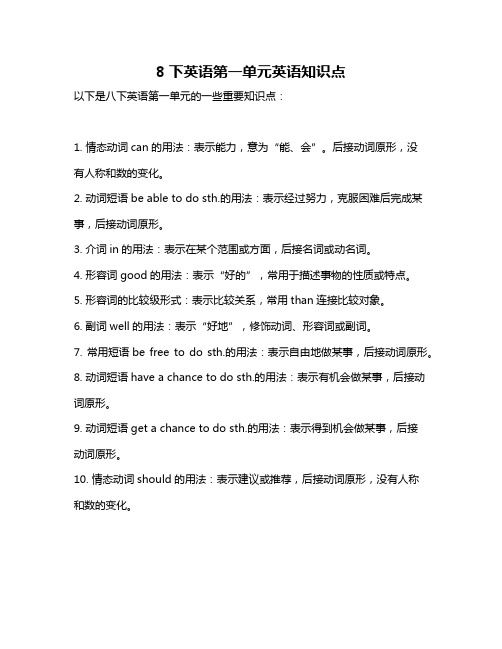
8下英语第一单元英语知识点
以下是八下英语第一单元的一些重要知识点:
1. 情态动词can的用法:表示能力,意为“能、会”。
后接动词原形,没
有人称和数的变化。
2. 动词短语be able to do sth.的用法:表示经过努力,克服困难后完成某事,后接动词原形。
3. 介词in的用法:表示在某个范围或方面,后接名词或动名词。
4. 形容词good的用法:表示“好的”,常用于描述事物的性质或特点。
5. 形容词的比较级形式:表示比较关系,常用than连接比较对象。
6. 副词well的用法:表示“好地”,修饰动词、形容词或副词。
7. 常用短语be free to do sth.的用法:表示自由地做某事,后接动词原形。
8. 动词短语have a chance to do sth.的用法:表示有机会做某事,后接动词原形。
9. 动词短语get a chance to do sth.的用法:表示得到机会做某事,后接
动词原形。
10. 情态动词should的用法:表示建议或推荐,后接动词原形,没有人称
和数的变化。
以上是八下英语第一单元的一些重要知识点,通过熟练掌握这些知识点,有助于提高英语语言能力。
人教 英语 八年级下册 1单元知识点笔记

Unit1 What’s the matter?1.What’s the matter with sb?常用来询问别人怎么了,也用于医生询问病人有什么不舒服。
= What’s the trouble with sb= What’s the problem with sb?= What’s wrong with sb=What happened to sb?2.常见的患病表达:1.Have a +身体部位+ache. I have a headache.2.Have a+sore+身体部位I have a sore back.3.Have a+ 病症She has a cold.4.There is something wrong with +one’s+身体部位。
There is something wrong with my head. 我的头不舒服。
3.Should 情态动词,(can, may, must , could, will, would等)Should+动词原形;一般疑问句: Should +主语+V原形。
?一般疑问句的回答:Yes,主语(对应人代)+should.No, 主语(对应人代)+shouldn’t.否定句:主语+shouldn’t+V原形。
特殊疑问句:特殊疑问词+should+主语+V原形?4.反身代词的构成由第一人称、第二人称形容词性物主代词或第三人称代词宾格加self或selves组成,意为“本人;亲自;自己”一/二人称:My self, our selves, your self, your selves, 三人称:him self, her self, it self, them selves.常见词组: learn sth by oneself 自学help oneself to…随便吃….Enjoy oneself 玩得开心5.lie,动词:撒谎,lied, lied, lying 名词: 谎言lie,平躺,lay, lain, lying lie down 躺下lay, 下蛋,布置,laid, laid, laying.6.Without, 做介词,意为“没有;无”反义词为“with”后接名词/代词宾格/动名词动词固定搭配:1.be used to doing sth…习惯做某事2.have problems(in) doing sth 做某事有困难=have difficulty (in) doing sth=have trouble(in) doing sth.3.mean doing sth 意为着做某事mean to do sth 打算做某事词汇(红色为重要词汇):1.have a cold 感冒2.have a fever 发烧3.have a sore back 背痛4.have a stomachache 胃痛5.lie down and rest 躺下休息6.see a dentist 看牙医7.get an X-ray 拍X光片8.take one’s temperature 量体温9.cut oneself 割伤自己10.put some medicine on….在。
- 1、下载文档前请自行甄别文档内容的完整性,平台不提供额外的编辑、内容补充、找答案等附加服务。
- 2、"仅部分预览"的文档,不可在线预览部分如存在完整性等问题,可反馈申请退款(可完整预览的文档不适用该条件!)。
- 3、如文档侵犯您的权益,请联系客服反馈,我们会尽快为您处理(人工客服工作时间:9:00-18:30)。
1.What's the matter?What's the matter?和What's wrong?是用来询问对方出了什么毛病或问题,意为“怎么了?”,是医生询问病人病情时的常用语。
— What's the matter? 你怎么了?—I have a stomachache. 我胃疼。
—What's wrong, Tom? Tom怎么了?—I don't feel very well. 我感觉不太舒服What's the matter?和What's wrong?后可接with sb. / sth.,即What's the matter with sb./ sth.?或What's wrong with sb./sth.?意为“某人/某物怎么了?”What's the matter with you? = What's wrong with you? 你怎么了?—What's wrong / What's the matter with your leg? 你的腿怎么了?—Nothing. 没什么。
注意:matter是名词,其前只能加定冠词the;wrong是形容词,前面不需要加任何冠词。
不能说What's your wrong? 和What's your matter?2. —What should she do?—She should take her temperature.should作情态动词,意为“应当,应该”。
表示义务、责任,可用于各种人称,无人称和数的变化,也不能单独作谓语,只能和主要动词一起构成谓语,表示说话人的语气和情态;否定形式为should not,缩写为shouldn't。
其主要用法有:(1) 表示责任和义务,意为“应该”。
You should take your teacher's advice.You shouldn't be late for class.(2) 表示推断,意为“可能,该”。
The train should have already left.3. But to his surprise,they all agreed to go with him.(1) surprise作动词时,意为“使……惊奇,使……感到意外、吃惊”。
What surprised you? 什么事使你感到意外?(2) surprise作不可数名词时,表示“惊奇,惊异”。
Her face showed surprise at the news.(3) surprise作可数名词时,表示“惊奇、惊讶、意外的事或吃惊的事”。
He gave me a surprise by arriving early.(4)作名词用时常可构成如下短语:to one's surprise意为“使某人吃惊的是……”;in surprise意为“吃惊地”。
To my surprise, he passed the exam.He looked at me in surprise.4. He was not ready to die that day.(1)ready 作形容词,意为“准备好的”。
Is everything ready?Are you ready?(2)be/get ready to + 动词原形,意为“准备做……”。
I'm getting ready to travel.【拓展】be ready for意为“准备去……”,后接名词或动名词,同义短语为get ready for。
I'm ready for bed.The chicken will soon be ready for the pot。
5. Aron loves mountain climbing and doesn't mind taking risks.mind作及物动词,意为“介意、照料、留神、注意”。
常用于疑问句、否定句、条件句中,后面接名词、代词、动词-ing形式或从句。
Would you mind opening the window? 你介意打开窗户吗?Don't mind me.不要管我。
【拓展】mind还可作名词,意为“智力、头脑、想法、意见”。
He has quick mind.Tom changed his mind at last.I. 按括号中的要求改写句子。
1. We had a good time in the park yesterday. (同义句转换)We ________ ________ in the park yesterday.2. Sleeping eight hours a night is very important. (同义句转换)________ very important ________ ________ eight hours a night.3. It's important that we should eat a balanced diet. (同义句转换)It's important ________ ________ ________ ________ a balanced diet.4. What's the matter with you? (同义句转换)What's ________ ________ you?5. I think I have a cold. (改为否定句)I ________ ________ I ________ a cold.6. She has a toothache. (对划线部分提问)________ the ________ ________ her?7. My head hurts. (同义句转换)I ________ a ________.8. There is a tall building in front of my house. (同义句转换)A tall building ________ in front of my house.9. He need not return the book three days ago. (同义句转换)He ________ ________ ________ return the book three days ago.10. I hope to buy a present for my mother with my own money. (同义句转换)I hope ________ I ________ ________ a present for my mother with my own money. II.根据汉语提示完成下列句子。
1. —你的手表怎么了?—它不走了。
— ________ ________ ________ your watch?— It's doesn't work.2. 多吃蔬菜和水果对我们来说是必要的。
It's necessary ________ us ________ ________ more fruit and vegetables.3. 那个男孩喜欢用英语和别人说话。
The boy ________ ________ ________ others in English.4. —你怎么了?—我牙疼。
— ________ ________ ________?— I have a ________.5. 你看上去气色不好,请躺下休息一下吧。
You don't look ________. Please ________ ________ and have a rest.6. 你应该帮助你母亲做家务。
You ________ ________ your mother ________ the housework.7. 你介意调低音乐吗?Would you ________ _______ _______the music?8. 所有学生在为运动会做准备。
All the students ______ ______ ______ ______the sports meeting. III. 从方框里选择下列句子的对应答语。
1. You look sick. What's the matter?__________2. I don't want to eat meat for lunch. _________3. I feel really ill. What should I do? __________4. Let's have soup instead of pizza. __________5. I have a bad toothache.__________1. enjoyed ourselves2. It's; to sleep3. for us to eat4. wrong with5. don't think; have6. What's; matter with7. have; headache8. lies/9. didn't need to 10. that; can buy1. What's wrong with2. for; to eat3. enjoys/likes talking with/to4. What's the matter; toothache5. well; lie down6. should help; with/do7. mind turning down8. are getting ready for1. D2. C3. A4. B5. E。
